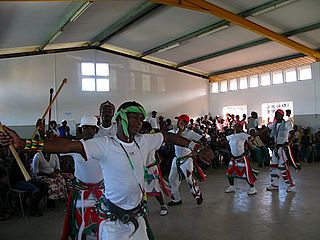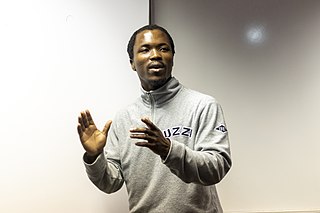
Ayanda Ngila (1992–2022), was a land activist, a prominent leader in the shack dweller's movement Abahlali baseMjondolo [1] [2] and deputy chairperson of its eKhenana Commune. [3] [4] [5] [6] [7] He was assassinated on 8 March 2022. [8]

Ayanda Ngila (1992–2022), was a land activist, a prominent leader in the shack dweller's movement Abahlali baseMjondolo [1] [2] and deputy chairperson of its eKhenana Commune. [3] [4] [5] [6] [7] He was assassinated on 8 March 2022. [8]
The eKhenana Commune, a well known branch of the social movement Abahlali baseMjondolo, has been the target of repression for many years. [9] In March 2021, Ngila along with three other leaders of the movement, Lindokuhle Mnguni, Landu Shazi and Maphiwe Gasela, were arrested and charged with murder. [10] They were held without bail for six months. While in prison Ngila participated in a reading group that read work by thinkers like Paulo Freire and Frantz Fanon. [11]
The state withdrew charges against all four leaders on 1 October 2021 after admitting that it had no evidence against any of them. The arrests were part of a string of arrests of other Abahlali baseMjondolo leaders including Nokuthula Mabaso and Mqapheli Bonono, which have widely been referred to as politically motivated. [12] [13] [14] [15] [16]
Retired Anglican bishop for KwaZulu-Natal, Rubin Phillip, reacted with concern at what he deemed to be another instance of false arrest of Abahlali baseMjondolo members. The Socio-Economic Rights Institute criticised the National Prosecuting Authority for not ensuring that Ngila and his co-accused received their constitutional right to a speedy bail application process. University of Johannesburg professor Jane Duncan noted the way the criminal justice system was being abused to break the community. [17]
Ngila was assassinated on 8 March 2022 by four attackers, while on his way to fix a water pipe at the eKhenana Commune, in Cato Manor, Durban, South Africa. [18] [19] [20] His murder, which also targeted the settlement's chairperson, Lindokuhle Mnguni, is said to have been carried out by hit-men linked to the local taxi industry and local political leaders in the African National Congress. [21] [22] [23] [24]
Khaya Ngubane, the son of a local ANC politician, was later arrested for Ngila's murder. Nokuthula Mabaso, a state witness in Ngila's assassination was herself shot and killed on 5 May 2022. [25] [26] After Mabaso was killed, Ngubane was denied bail. [27] On 20 August 2022 the second key witness in Ngila's murder, Lindokuhle Mnguni was also assassinated. [28] [29]
The assassination was widely condemned by South African and internationally including in a widely publicised letter from over 130 civil society organisations. [30] Prominent public interest law firm, the Socio-Economic Rights Institute of South Africa (SERI), called on the Minister of Police and the South African Human Rights Commission to investigate his assassination. [31] [32]
The international human rights organisations that issued statements of concern included the Kairos Center in New York, [33] the Habitat International Coalition, [34] the International Network for Economic, Social and Cultural Rights [35] and Frontline Defenders. [36]
The assassination of Abahlali baseMjondolo activists, including Ngila, was discussed at the 51st session of the United Nations Human Rights Council in 2022. [37]
The assassination was also condemned by a host of popular organisations across Africa including the eSwatini republican movement PUDEMO [38] whose leader attended Ngila's funeral, the Socialist Movement of Ghana, [39] the South African Federation of Trade Unions as well as the largest trade union in the country, the National Union of Metalworkers of South Africa. [40] [41] [42]
On 17 July 2023, Khayalihle Gwabuzela (known as Khaya Ngubane), was found guilty of the murder of Ngila in the Durban High Court. [43] He was handed down a sentence of fifteen years imprisonment. [44]
Cato Manor is a settlement located 7 kilometres (4.3 mi) from the city centre of Durban, South Africa.

Abahlali baseMjondolo is a socialist shack dwellers' movement in South Africa which primarily campaigns for land, housing and dignity, to democratise society from below and against xenophobia.
The "Third Force" was a term used by leaders of the ANC during the late 1980s and early 1990s to refer to a clandestine force believed to be responsible for a surge in violence in KwaZulu-Natal, and townships around and south of the Witwatersrand.

Sibusiso Innocent Zikode is president of the South African shack dwellers' movement, which he co-founded with others in 2005. Abahlali baseMjondolo claims to have an audited paid up membership of over 115 000 across South Africa. His politics have been described as 'anti-capitalist'. According to the Mail & Guardian "Under his stewardship, ABM has made steady gains for housing rights."

Kennedy Road is an informal settlement in Durban (eThekwini), in the province of KwaZulu-Natal in South Africa. Formed in the late 1970s or early 1980s, the settlement was mentioned by the African National Congress (ANC) after the end of apartheid but amenities were not improved. The site is mostly not connected to sanitation or electricity. Dissatisfaction with local councillors led to 2005 protests including a road blockade, out of which the shack dwellers movemment Abahlali baseMjondolo (AbM) formed. In 2009, an AbM meeting was attacked resulting in two deaths and a court case. More recently, the municipality has improved facilities and promised to relocate inhabitants.
The South African Unemployed Peoples' Movement is a social movement with branches in Durban, Grahamstown and Limpopo Province in South Africa. It is often referred to as the Unemployed People's Movement or UPM. The organisation is strongly critical of the ruling African National Congress government.
South Africa has been dubbed "the protest capital of the world", with one of the highest rates of public protests in the world.
Rubin Phillip is bishop of the Anglican Diocese of Natal. The great-grandchild of indentured labourers from Andhra Pradesh, Phillip is the first person of Indian heritage in South Africa to hold the position of Bishop of Natal. He grew up in Clairwood, a suburb of Durban with a large concentration of people of Indian descent, in a non-religious household, but converted to Christianity. He was a noted anti-apartheid activist and spent three years under house arrest in the 1970s and was banned in 1973. He was enthroned as bishop in February 2000.
The attack on Kennedy Road in Durban, South Africa, occurred on 26 September 2009. A mob of men armed with bush knives, guns and bottles entered the Kennedy Road informal settlement searching for leaders of the shackdwellers movement Abahlali baseMjondolo (AbM). They looted shacks and threatened residents, before attacking a hall where a youth meeting was happening. Two people were killed and around a thousand were displaced. In the aftermath, AbM representatives such as S'bu Zikode went into hiding and thirteen AbM members were arrested.
Michael Sutcliffe is the former municipal manager of the eThekwini Metropolitan Municipality, which includes the city of Durban, South Africa. During his time in the position he was widely reported to be a controversial figure amongst Durbanites and was the target of popular protest in the city.
The Constitution of South Africa protects all basic political freedoms. However, there have been many incidents of political repression, dating back to at least 2002, as well as threats of future repression in violation of this constitution leading some analysts, civil society organisations and popular movements to conclude that there is a new climate of political repression or a decline in political tolerance.
There have been many political assassinations in post-apartheid South Africa. In 2013 it was reported that there had been more than 450 political assassinations in the province of KwaZulu-Natal since the end of apartheid in 1994. In July 2013 the Daily Maverick reported that there had been "59 political murders in the last five years". In August 2016 it was reported that there had been at least twenty political assassinations in the run up to the local government elections on the 3rd of August that year, most of them in KwaZulu-Natal.
In March 2013 around a thousand people occupied a piece of land in Cato Crest, Durban and named it Marikana after the Marikana miners' strike. Mayor James Nxumalo blamed the occupation on migrants from the Eastern Cape. He was strongly criticised for this by the shack dwellers' movement Abahlali baseMjondolo who said that "The City Hall is red with blood".
Bandile Mdlalose was the general secretary of the South African shackdwellers' movement Abahlali baseMjondolo. She is now the President of the Community Justice Movement which operates in some informal settlements of Gauteng and KwaZulu Natal.
Nqobile Nzuza was a resident in the Marikana Land Occupation in Cato Crest, which is part of Cato Manor in Durban, South Africa. She was a member of the shackdwellers' movement Abahlali baseMjondolo.
Nkululeko Gwala originally from Inchanga in KwaZulu Natal, was a resident of Cato Crest, which is part of Cato Manor in Durban, and a supporter of the Marikana Land Occupation (Durban). He was also a prominent member of the shackdwellers' social movement Abahlali baseMjondolo and chairperson of their Cato Crest Branch. He was assassinated on 26 June 2013.

Nokuthula Mabaso, was a prominent leader in Abahlali baseMjondolo and one of the leaders of its women's league. She was a leader in the eKhenana Commune. She was assassinated on 5 May 2022.

The eKhenana Commune is a prominent land occupation in the historic working-class area of Cato Manor in Durban, South Africa. According to the Socio-Economic Rights Institute "The eKhenana settlement is organised as a cooperative in which residents collectively run a communal kitchen and tuck shop, theatre, poetry and music projects, and care for a vegetable garden named after the late Nkululeko Gwala [assassinated in 2013] as well as a poultry farm named in honour of the late S’fiso Ngcobo [assassinated in 2018]. The Commune has solar power and is also home to a political school that residents named the Frantz Fanon School, as well as the Thuli Ndlovu Community Hall [Ndlovu was assassinated in 2014]. The Commune has suffered sustained political repression, including multiple arrests and three assassinations in 2022.

Lindokuhle Mnguni was a land activist and a prominent leader in the shack dwellers' movement Abahlali baseMjondolo. He was chairperson of the movement's youth league as well as the chairperson of the eKhenana Commune. He was a leader of eKhenana's food sovereignty project which sought to make the commune more self-sustaining and independent. He was assassinated on 8 August 2022.